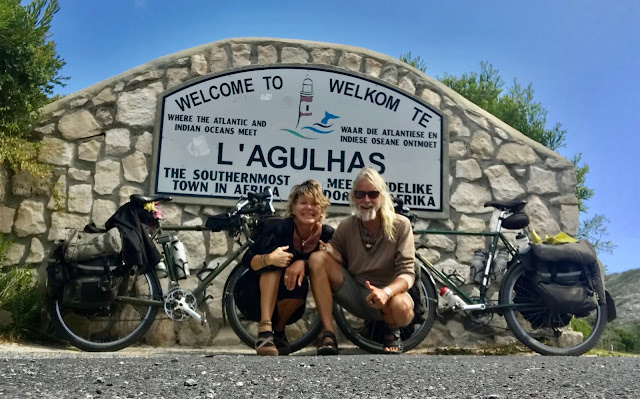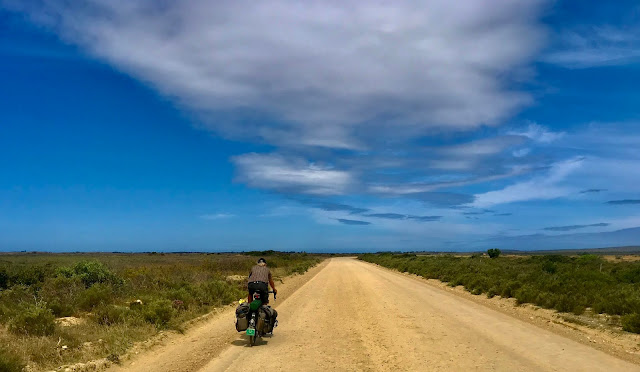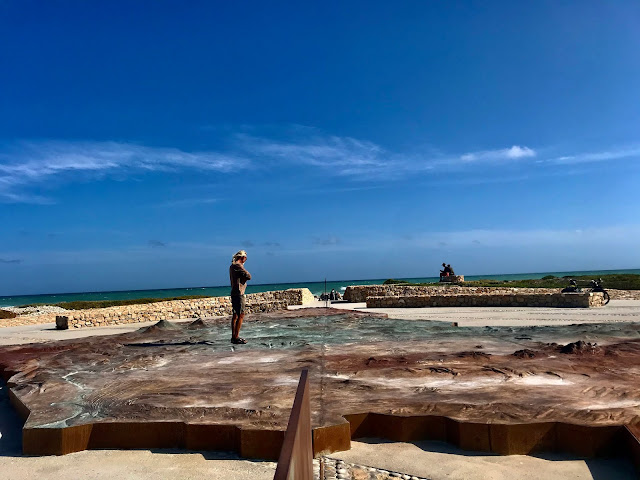L’Agulhas....most southern point of the African Continent. November 25th 2019
We finally left CapeTown and the west side of Africa ...has it been four weeks already?
We “WarmShowered” around, so to not annoy any of our hosts with overstaying while we are waiting for our little package from the US. (Which finally arrived at the Mail Hub after its four week journey) Though -really - there was no sign of being unwelcome at all, the contrary.....I might add! It was grand to meet people who are - again - so generous and helpful ....we learned so much from each and every one of them.
Surprising was, that we didn’t get to stay with any colored or black Africans. Explained here with some help of the “Lonely Planet” to articulate this difficult subject:
We learned that cultural apartheid still exists in South Africa. To an extent, discrimination based on wealth is replacing that based on race; most visitors will automatically gain high status. There are, however, still plenty of people who think that a particular skin colour means a particular mindset. A few believe it means inferiority.
The constant awareness of race, even if it doesn’t lead to problems, is an annoying feature of travel in South Africa, whatever your skin colour. Racial discrimination is illegal, but it’s unlikely that the overworked and under-resourced police force will be interested in most complaints.
If you are of African descent, you may well encounter racism from some white and coloured people. Do not assume a special bond with black South Africans either. The various indigenous peoples of South Africa form distinct and sometimes antagonistic culture groups.
Although most blacks in Cape Town are Xhosa, hailing from Eastern Cape Province, they are not the only group in the city. Cape Town’s economy has attracted people from all over Southern Africa, including many immigrants from the rest of the continent – a lot of the car-parking marshals, traders at the city’s various craft markets and waiters in restaurants are from Zimbabwe, Nigeria, Mozambique and the like.
Xhosa culture is diverse, with many clan systems and subgroups. Within the black community there are also economic divisions and subgroups based on culture, such as the Rastafarian community in the Marcus Garvey district of the township of Philippi.
There are distinct cultural differences in the white community here, depending on whether people are descendants of the Boers (Dutch) or the British and other later European immigrants to South Africa. The Boers’ history of geographical isolation and often deliberate cultural seclusion has created a unique people who are often called ‘the white tribe of Africa’.
Afrikaans, the only Germanic language to have evolved outside Europe, is central to the Afrikaner identity, but it has also served to reinforce their isolation from the outside world. You’ll find Afrikaans to be a much stronger presence in the northern suburbs of Cape Town and in the country towns of the Cape, especially around Stellenbosch, which has a prominent Afrikaans university.
Most other white Capetonians are of British extraction. Cape Town, as the seat of British power for so long, is somewhat less Afrikaner in outlook than other parts of the country. White liberal Capetonians were regarded with suspicion by more-conservative whites during the apartheid years.
Although there are many people who find the old apartheid racial terms 'white', 'black', 'coloured' and 'Indian' distasteful and want to break away from the stereotypes they imply, it’s a fact that in South Africa these words are used by everyone, quite often without any rancour or ill feeling.
This as an important “side note”
We left CapeTown less than a week ago....on the road again...always a thrilling endeavor.
The aches and pains of age (or who knows where they come from) just little annoying discomforts in the joints or muscles while we are stationary....and when we start moving...cycling that is, they miraculously disappear: disintegrate into moving air - away they go as we are heading along the coast to the most southern point of the continent. Two oceans meet here -
the Atlantic Ocean and the Indian Ocean.
the Atlantic Ocean and the Indian Ocean.
L’Agulahs.
Enormous winds keep my head empty of thoughts.
Luckily I didn’t need to get cranky...the wind was mostly on our backs playing around with us at times with a little or a lot of cross wind. The surroundings are exhilarating
African continent monument - Sahara in the foreground....Gurly leaning on the wall
and the astonishing hospitality of the little Backpackers
near the Oceans Point where they let us camp, keeps us uplifted.....not as in lifting up.
A little paradise where we’ve been contemplating our next move.

















Comments
Post a Comment